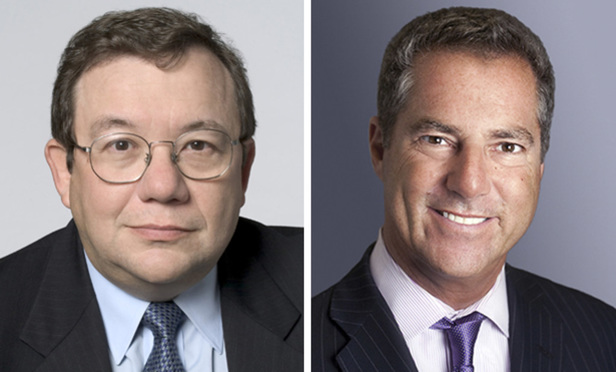Martin Flumenbaum

September 21, 2020 | New York Law Journal
Second Circuit Review: The Second Circuit in the Supreme CourtIn their Second Circuit Review column. Martin Flumenbaum and Brad S. Karp review of the performance of the U.S. Court of Appeals for the Second Circuit during the past term.
By Martin Flumenbaum and Brad S. Karp
12 minute read

August 25, 2020 | New York Law Journal
Holding Police Accountable: Second Circuit Issues Opinion in 'Walker'This decision comes at a pivotal moment, as demands to transform policing have spread across the nation and the role of police and the consequences of law enforcement overstepping legal boundaries are under increased scrutiny, write Second Circuit Review columnists Martin Flumenbaum and Brad S. Karp.
By Martin Flumenbaum and Brad S. Karp
8 minute read

July 21, 2020 | New York Law Journal
High Court Affirms 2nd Circ. in Holding Title VII Prohibits Sexual DiscriminationIn their Second Circuit Review, Martin Flumenbaum and Brad S. Karp discuss the U.S. Supreme Court's ruling in Zarda v. Altitude Express.
By Martin Flumenbaum and Brad S. Karp
11 minute read

June 23, 2020 | New York Law Journal
COVID-19 and the New York Democratic PrimaryIn their Second Circuit Review, Martin Flumenbaum and Brad S. Karp discuss how the Second Circuit reaffirmed the manifest importance of First Amendment speech and associational rights, even in the face of a global pandemic.
By Martin Flumenbaum and Brad S. Karp
9 minute read

May 26, 2020 | New York Law Journal
Sentencing Under the First Step ActIn their Second Circuit Review, Martin Flumenbaum and Brad S. Karp discuss the court's first published opinion examining the scope of relief offered to certain persons convicted of crack cocaine offenses under the First Step Act. The Second Circuit held that the First Step Act is a statutory source of sentencing relief independent from the U.S. Sentencing Guidelines or any other policy statement that may otherwise preclude a reduction in sentence.
By Martin Flumenbaum and Brad S. Karp
8 minute read

April 21, 2020 | New York Law Journal
The Second Circuit in the COVID-19 EraIn their Second Circuit Review, Martin Flumenbaum and Brad S. Karp discuss how the pandemic has affected the court, including oral arguments and number of appeals filed, and what to watch for as the crisis develops.
By Martin Flumenbaum and Brad S. Karp
6 minute read

March 23, 2020 | New York Law Journal
The 'Advanced Knowledge' Prong of the FLSA's 'Learned Professional' ExemptionIn their Second Circuit Review, Martin Flumenbaum and Brad S. Karp discuss a recent decision in which the court clarified the standard for determining whether an employee utilizes "advanced knowledge" necessary to qualify for the "learned professional" exemption to the Fair Labor Standards Act's (FLSA) overtime-compensation mandate.
By Martin Flumenbaum and Brad S. Karp
8 minute read

February 25, 2020 | New York Law Journal
Narrowing the Definition of Quid Pro QuoIn their Second Circuit Review column, Martin Flumenbaum and Brad Karp discuss 'United States v. Silver,' a decision they write "limits significantly the Second Circuit's longstanding bribery precedent, raising the bar for what the government must prove to establish the existence of a quid pro quo in public corruption cases."
By Martin Flumenbaum and Brad S. Karp
9 minute read

January 28, 2020 | New York Law Journal
Personal Benefit in Title 18 Insider Trading CasesIn their Second Circuit Review, Martin Flumenbaum and Brad S. Karp discuss the court's recent decision in 'United States v. Blaszczak', which significantly expanded insider trading enforcement authority.
By Martin Flumenbaum and Brad S. Karp
10 minute read

December 24, 2019 | New York Law Journal
Narrowing the Bounds of 'Windfall' Restitution Awards in Financial Fraud CasesIn their Second Circuit Review column, Martin Flumenbaum and Brad S. Karp discuss 'U.S.v. Calderon,' where the Second Circuit limited the availability of "windfall" restitution awards and narrowed its interpretation of the "proximate cause" requirement for financial fraud victims under the Mandatory Victims Restitution Act of 1996.
By Martin Flumenbaum and Brad S. Karp
10 minute read
Trending Stories
- 1TikTok Law and TikTok Politics
- 2California Supreme Court Vacates Murder Conviction in Infant Abuse Case
- 3New York’s Proposed Legislation Restraining Transfer of Real Property
- 4Withers Hires Lawyers, Staff From LA Trusts and Estates Boutique
- 5To Speed Criminal Discovery, NY Bill Proposes Police-to-Prosecutor Pipeline For Records
More from ALM
- Scan In Progress: Litigators Leverage AI to Screen Prospective Jurors 1 minute read
- Legal Speak at General Counsel Conference East 2024: Match Group's Katie Dugan & Herrick's Carol Goodman 1 minute read
- Legal Speak at General Counsel Conference East 2024: Eric Wall, Executive VP, Syllo 1 minute read



